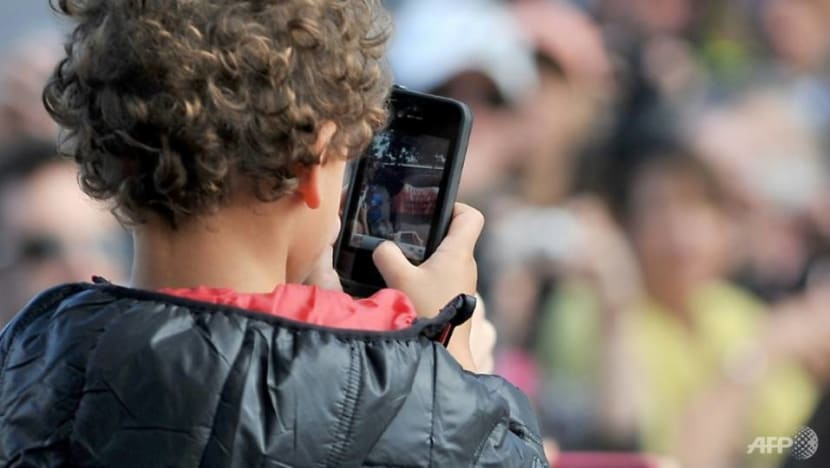commentary Commentary
Commentary: Smartphones a double-edged sword but many think they’re great sword wielders
Findings from a recent study suggest a tension for regulation where smartphones bring benefits but come with ramifications often underestimated, say Pew Research Center’s Laura Silver and Lee Rainie.

A man sending a message on his smartphone. (Photo: Pixabay)
WASHINGTON: In India, violence abetted by rumours and misinformation spread on messaging platforms has spawned anxious efforts by WhatsApp to shut down abusive accounts and limit users’ ability to forward messages to large groups. It also prompted Prime Minister Narendra Modi to propose new rules that would force social media apps to remove content deemed unlawful.
In the Philippines — where nine in 10 smartphone users have a Facebook account — there are ongoing struggles over misinformation, some of which jailed journalist Maria Ressa blamed on the social media site.
In Vietnam, longstanding battles over dissent and information policies prompted the government to pass a law against anti-government comments on social media, immediately stirring concerns about censorship.
READ: India's 'WhatsApp election' will fuel the misinformation blame game, a commentary
Indeed, the rapid spread of mobile devices — especially smartphones — and social media have brought frightening and difficult problems to many countries in this region.

SMARTPHONES GREAT FOR INDIVIDUALS, LESS SO FOR SOCIETY
Still, Asia is hardly the only region where new political and social tensions have been spawned by rapidly advancing mobile connectivity.
The patterns that play out in India, the Philippines and Vietnam are similar to those seen in the other eight emerging economies recently surveyed by Pew Research Center in a project designed to explore public attitudes toward the role of mobile connectivity at the personal and societal level.
Alongside these new challenges, the surveys found, people see many benefits to mobile connectivity — creating a push-pull, or even love-hate, relationship with their devices.
Some of these tensions likely stem from an often-seen pattern in which people believe themselves to be more equipped than the general public to handle challenges and seize opportunities. This “I’m okay, they’re not” theme is common across a range of issues and cultures.
For example, 84 per cent of Americans are somewhat or very confident in their ability to recognise made-up news, even as 64 per cent think such made-up news is sowing a great deal of confusion about current events among the general public.
READ: Don't blame the kids, it's grandparents who share more fake news, a commentary
In Pew Research Center’s 11-country surveys about mobile connectivity, more people say mobile phones are a good thing for them than society.
In the Philippines, for example, 81 per cent of adults say mobile phones are good for them, compared with 72 per cent who say they are good for society. In India, the optimism gap is 5 percentage points (73 per cent versus 68 per cent) and in Vietnam, it’s 4 points (87 per cent versus 83 per cent).
SMARTPHONES GREAT FOR EDUCATION, BUT HARMFUL FOR CHILDREN
Other love-hate tensions are even more stark. In the three Asian countries surveyed, there is a great deal of tension between seeing mobile phones as having a positive impact on education versus a harmful impact on children in general.

READ: One US lawmaker is onto something with her big ideas on Big Tech, a commentary
In the Philippines, 81 per cent say increasing use of mobile phones has been good for education, but just 44 per cent say mobile phones have had a good influence on children.
In India, 67 per cent say mobile phones are good for education, while 38 per cent say they have had a good influence on children.
Meanwhile, in Vietnam, 56 per cent say phones are good for education, yet only 25 per cent believe they have had a good impact on children.
One possible source of this tension is that majorities in the three countries express concern about the possibility that phones might expose children to immoral or harmful content.
Fully 78 per cent of adults in the Philippines say they are very concerned about this possibility, as do 73 per cent in Vietnam and 55 per cent in India, making it the number one technology-related concern (out of six different concerns included on the survey, including identity theft, exposure to false or incorrect information, mobile phone addiction, harassment or bullying, and losing the ability to communicate face-to-face) in each of these countries.
READ: Teach your kids to think and question ads, a commentary
One 38-year-old woman in a Philippines-based focus group summed up some of these concerns, declaring:
For me the positive effects are that when they have assignments they can use Google to do their research, like finding the definition of different terms … But the negative thing is that my 15-year-old teen uses group chat. He doesn’t have time to talk to us. Then there are times that I’m limiting the use of his cellphone ... It really destroys them even though you set a limit. They cannot let go of their phones.
SMARTPHONES HAVE HELPED PEOPLE GET MORE INFORMATION BUT FAKE NEWS STILL A CONCERN
Another tension in these countries involves mobile phones’ impact on news and information.

READ: Critical thinking, a needed nutrition to resist the virus of falsehoods, a commentary
On one hand, around three-quarters or more of adult mobile phone users in Vietnam (73 per cent), India (81 per cent and the Philippines (85 per cent) say their phones have mostly helped their ability to obtain information about news and important issues.
On the other hand, 64 per cent of Filipinos are very concerned that mobile phones might expose people to rumours and false information, as are 48 per cent of Vietnamese and 45 per cent of Indians. In India, these concerns are second only to concerns about children.
CONCERNS OVER FAMILY COHESION AND PHONE ADDICTION
Finally, tension emerges around social and family cohesion. Across countries, the vast majority of adult mobile phone users say their phone has helped them stay in touch with people who live far away — 95 per cent in India, 94 per cent in the Philippines, 87 per cent in Vietnam.
But smaller shares of all adults say mobile phones have had a good impact on family cohesion — 78 per cent of Filipinos say this, as do 53 per cent of Indians and Vietnamese. Additionally, between 32 per cent and 46 per cent of each Asian public surveyed voice concern about mobile phones harming people’s ability to communicate face-to-face.
They also worry about mobile phone addiction, especially in the Philippines, where 62 per cent are very concerned about this, and Vietnam, where 53 per cent have that level of concern. And Filipino adult mobile phone users are more likely to say their phones make them waste time than help them save time (50 per cent versus 41 per cent).
READ: Alone together? How smartphones have changed family time, a commentary

These crosscurrents of appreciation and dread present policymakers with a tough set of choices. How should they calibrate communications and media policy to maximise the things about the mobile-social package that clearly work for individual users, while addressing the potential societal challenges that accompany those benefits?
These Asian countries are certainly not alone in this regard. Pew Research Center’s surveys in the other eight emerging economies, as well as other survey work done in the United States, suggest that the emergence of both positive and negative changes from digital technologies are a global problem that will require a skillful governmental balancing act, as well as some individual behavioural changes.
Still, as one 53-year-old Filipino woman in a focus group declared, “You just have to think before you click, right? But you can’t make all of them do it”.
Laura Silver is senior researcher at the Pew Research Center. Lee Rainie is Director of Internet and Technology research at the same centre.
















